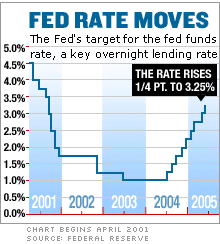 |
| Fed Chairman Alan Greenspan is due to give his semi-annual testifmony before Congressional committees Wednesday and Thursday. |
|
 |
|
|
|
|
NEW YORK (CNN/Money) - The only thing more difficult to parse through than Alan Greenspan's testimony to Congress can be the questions he gets from senators and representatives.
The Federal Reserve chairman goes to Capitol Hill Wednesday and Thursday for what could be the last of his semi-annual appearances. Greenspan's term ends Jan. 31, though its possible there could be a short extension until his successor is confirmed.
It would be a nice send-off if there were some nice clean questions posed to Greenspan. It would be even nicer, and even less likely, to get some clean answers back from him.
Here are some top-of-mind questions:
Is bubble popping one of the Fed's jobs?
In December 1996 Greenspan made his famous pronouncement that stock prices represented "irrational exuberance." He then sat back and did little more as stock prices soared to unimagined heights over the next four years, followed by a painful fall.
These days, there's a lot of talk about a bubble in real estate prices. Greenspan has dismissed the idea of a national bubble in home prices, though he did say there are enough local markets with inflated prices to give the markets the appearance of "froth."
Dean Baker, co-director of the Center for Economic and Policy Research and one of those arguing that there is a housing bubble, says that no matter what Greenspan feels about the current market conditions, he'd like to know what he believes the Fed should do when it believes there is a bubble.
"Does he want to see it burst on its own, or is it appropriate for the Fed to move to deflate asset bubbles?" asked Baker.
What qualities should your successor have?
Member of Congress on both sides of the divide seem to have a lot of strong ideas on what qualities the next Supreme Court justice should have.
But there's a lot less attention being given to what qualities the next Fed chairman should bring to the job.
"It'd be fascinating to hear what he thinks, if he'd actually tell you," said Fed watcher Tom Schlesinger, executive director Financial Markets Center. "The guys who are most frequently mentioned for the job are all ivory tower types. I don't think anyone has the breadth and experience dealing with the business community as Greenspan did when he came on the job. Certainly they don't have as much experience as he accumulated in the past 17 years."
What inning are we really in?
The new Dallas Federal Reserve Bank president Richard Fisher caused a stir in early June when he said the Fed's course of interest rate hikes had entered the "eighth inning."
The Fed raised rates at its June 30 meeting, as expected, but also signaled that it intended to stay on the path of "measured" quarter-point interest rate hikes. The Fed has increased rates by a quarter percentage point at nine straight meetings stretching back to June 2004.
"There's an adage that the Fed cuts or hikes one time too many," said political economist Greg Valliere of Stanford Washington Research Group.
"If I was a member of Congress I'd try to press him on is there a light at the end of the tunnel on measured rate hikes, and at what point the Fed decides enough is enough," Valliere said. "You have to think after the August move we probably are in the eighth inning, but I doubt he'll be that explicit."
Should the next chairman keep his opinions to himself?
Greenspan has been willing to entertain all manner of questions from members of Congress beyond monetary policy, commenting on Social Security reform, tax policy and education.
Most of his predecessors declined to answer those types of questions, and plenty of Fed watchers would like to see a return to the past.
"He's Alan Greenspan all purpose sage," said Schlesinger. "He seldom has anyone tell him, 'Why don't you be more like Fed chairman of the past?'"
But while there have been a few members of Congress who have urged that path on him, far more of them are eager to get his opinion on a wide range of topics.
What do you want your legacy to be?
Few if any Fed chairmen have captured the public attention, and the accolades, of Greenspan. But there are many aspects of the Greenspan legacy that most members of the public probably don't think much about.
One is far greater transparency for the Fed's decision-making process. Having the Fed release statements when the Open Market Committee holds a meeting and releasing minutes of those meetings relatively soon thereafter were unheard of steps when Greenspan took office in August 1987.
Having markets have such confidence in the Fed's inflation-fighting credentials is another part of his legacy. As a result, long-term interest rates have remained low, helping many businesses and consumers.
But some Fed watchers think that Greenspan's greatest legacy is a willingness to question conventional thinking, such as the idea that the economy could enjoy both low inflation and low unemployment for a sustained period, as it has through much of his tenure.
"Greenspan is an orthodox thinker in most ways, but you have give him credit for questioning consensus thinking," said Schlesinger.
Even a Greenspan critic like Baker said the Fed may miss some of his instincts.
"He's made a big point in not adhering to rules, of going by his gut," said Baker. "Some of the folks who may follow -- like (White House economic adviser Ben) Bernanke -- are big fans of rules. I'm not a big fan of rules."

|